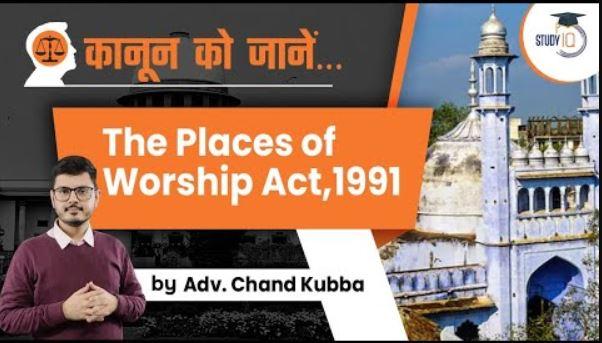History
- The Act was brought by the PV Narasimha Rao government in the background of the Ram temple movement.
- BJP leader LK Advani’s Rath Yatra was getting massive popular support and
- Further tensions rose high in the country after Advani was arrested in Bihar and Kar sevaks were shot at in Uttar Pradesh.
- In this background A Bill was introduced by the then-Union Home Minister in the Narasimha Rao Cabinet Mr. SB Chavan, to prevent communal unrest.
- While presenting the bill, Home Minister S B Chavan said: “It is considered necessary to adopt these measures in view of the controversies arising from time to time with regard to conversion of places of worship which tend to vitiate the communal atmosphere… Adoption of this Bill will effectively prevent any new controversies from arising in respect of conversion of any place of worship…”
Preamble of the Act
- “An Act to prohibit conversion of any place of worship and to provide for the maintenance of the religious character of any place of worship as it existed on the 15th day of August 1947 and for matters connected therewith or incidental thereto.”
- A very small Act with 7 Sections only.
Bar of conversion of places of worship
- No person shall convert any place of worship of any religious denomination or any section thereof into a place of worship of a different section of the same religious denomination or of a different religious denomination or any section thereof.
Declaration as to the religious character of certain places of worship and bar of jurisdiction of courts, etc
- 4(1) It is hereby declared that the religious character of a place of worship existing on the 15th day of August, 1947 shall continue to be the same as it existed on that day.
- Section 4(2) says any suit or legal proceeding with respect to the conversion of the religious character of any place of worship existing on August 15, 1947, pending before any court, shall abate — and no fresh suit or legal proceedings shall be instituted.
- Provided that if any suit, appeal or other proceeding, instituted or filed on the ground that conversion has taken place in the religious character of any such place after the 15th day of August, 1947, is pending on the commencement of this Act, such suit, appeal or other proceeding shall be disposed of in accordance with the provisions of sub-section (1).
- The Provisions of this section are not applicable to Ancient sites of archaeological importance and covered under Ancient Monuments and Archaeological Sites and Remains Act, 1958
- Act not to apply to Ram Janma Bhumi-Babri Masjid.—Nothing contained in this Act shall apply to the place or place of worship commonly known as Ram Janma Bhumi-Babri Masjid situated in Ayodhya in the State of Uttar Pradesh and to any suit, appeal or other proceeding relating to the said place or place of worship.
Punishment for contravention of section 3
- (1) Whoever contravenes the provisions of section 3 shall be punishable with imprisonment for a term which may extend to three years and shall also be liable to fine.
- 7. Act to override other enactments.—The provisions of this Act shall have effect notwithstanding anything inconsistent therewith contained in any other law for the time being in force or any instrument having effect by virtue of any law other than this Act
Law is challenged
- Law was a contravention of the principle of secularism as laid down by the Constitution.
- The Centre has barred remedies against illegal encroachment on places of worship and pilgrimages and now Hindus, Jains, Buddhists, Sikhs cannot file a suit or approach a high court under Article 226. Therefore, they won’t be able to restore their places of worship and pilgrimage including temple endowments in the spirit of Articles 25-26 and the illegal barbarian acts of invaders will continue in perpetuity,”
- it bars judicial review, which is a basic feature of the Constitution,
- imposes an “arbitrary irrational retrospective cutoff date”
- One of the petitioners challenging the Act said “maintenance of status quo as in 1947 in respect of religious places is like closing eyes similar to that of pigeons against advancement of cats. This…will mean preservation of tensions for the coming generations
- The petitioners had also claimed that Section 4 of the Act discriminates between Hindus and Muslims with respect to restoring possession of places of worship
Validity of the Act has been upheld in the Ayodhya case
- “The Places of Worship Act is intrinsically related to the obligations of a secular state.
- It reflects the commitment of India to the equality of all religions. Above all, the Places of Worship Act is an affirmation of the solemn duty which was cast upon the State to preserve and protect the equality of all faiths as an essential constitutional value, a norm which has the status of being a basic feature of the Constitution.
- The law speaks to our history and to the future of the nation.
- Historical wrongs cannot be remedied by the people taking the law in their own hands. In preserving the character of places of public worship, Parliament has mandated in no uncertain terms that history and its wrongs shall not be used as instruments to oppress the present and the future”,
- “The Places of Worship Act imposes a non-derogable obligation towards enforcing our commitment to secularism under the Indian Constitution. The law is hence a legislative instrument designed to protect the secular features of the Indian polity, which is one of the basic features of the Constitution…”
- “The Places of Worship (Special Provisions) Act ,1991 was introduced as a measure to provide and develop glorious traditions of love, peace, and harmony.”
Download| Free PDF

























 WhatsApp
WhatsApp